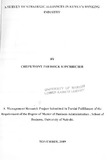| dc.description.abstract | Strategic alliances have become an important part of most company's portfolios. In an era of
rapid technological change, the ever rapidly changing competitive landscape, and the
globalization of competition more and more banks and companies are choosing to participate in
alliances. Strategic alliances involve co-operation between two or more firms who pool resources
together to create value proposition for the customers and within themselves. Often the decision
to participate in alliances is not one of the companies own choosing. With their competitors
entering into alliances, firms are often faced with few choices other than that of forming alliances
to nullify the potential advantage of their rivals.
Banks are operating in a very competitive environment. The interest rates which hitherto formed
the major source of incomes in most commercial banks are shrinking and have drastically
reduced. With the enactment of Central bank amendment act which aimed at controlling the
interest rates being charged on customers by banks, incomes are likely to be affected and reduce
in the long run.
The objectives of the study were to establish the motives which have led to strategic alliances in
the banking industry, establish the banks experiences in strategic alliances and to establish the
key challenges faced by banks on strategic alliances. The research design led to gaining an indepth
understanding on banks forming strategic alliances. The population was composed of all
the registered commercial banks in Kenya but mainly in Nairobi to enhance quick response from
the respondents. Data was collected by means of a questionnaire which had open ended
questions. The questions were administered to the respondents using hard copies sent by hand
and soft copies sent via electronic mail. For those send by hand, the "drop and pick later" method
was used. The respondents were from, Marketing, Strategic Planning, and Business
Development departments in the commercial banks. General information on strategic alliances in
the banking industry was done in terms of measures of frequency, standard deviations or
dispersion using SPSS software package. The results of analysis were presented in terms of pie
charts, graphs, tables, and percentages.
The study indentified joint sales, improved distribution channels and technology transfers as the
main purposes of entering into strategic alliances. The benefits banks derived from strategic
alliances were; new business opportunities, customer satisfaction and increase convenience).
The research findings established that profitability, technology, customer satisfaction,
competition and value addition as the main reasons as to why banks seek strategic alliances. It
was noted that specific technology, culture in banks and benefits were the main challenges banks
face when entering into strategic alliances
The study confined itself to strategic alliances in the banking industry only. This research
therefore should be replicated in other industries and the results be compared so as to establish
whether there is consistency among the industries in Kenyan economy. The study was also
limited by the sample size of commercial banks spread countrywide hence adequate time of
covering all. The researcher also encountered immense problems with the respondent's
unwillingness to complete the questionnaires in time. Five respondents did not bother to return
the questionnaires via email despite their earlier request that it's easier done on mail since it
saves in time wastage. Because of the time constraint, the researcher did not extend the duration
of the study so as to complete the survey on the strategic alliances in the banking industry in
Kenya. Further research is therefore recommended on how to negotiate with relevant skills and
on how to maintain the strategic alliances relationships in the banking industry. | en |

